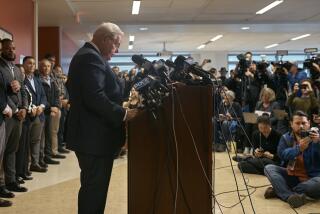Edward Snowden: Neither a hero nor a traitor
The debate over whether Edward Snowden should receive leniency from the federal government -- revived by a New Year’s Day editorial in The New York Times -- tracks the larger debate over Snowden encapsulated in the question: “Hero or traitor?” In other words, it’s mostly a debate between those who valorize Snowden and those who despise him. (Here’s an example of a deliciously nasty attack on him.)
That divide tracks a larger polarization over Snowden and his revelations, between those who believe that all of Snowden’s revelations are defensible (even those that had nothing to do with invasions of Americans’ privacy) and those, including President Obama, who argue that Snowden had no reason to go public.
Trite as it sounds, the truth lies in the middle. As The L.A. Times pointed out in an editorial in August:
“Snowden’s disclosures have inspired an overdue debate that was previously impossible because of the cloak of government secrecy that shrouded the surveillance programs. Without his revelation to the Guardian that the U.S. government was scooping up reams of information about the phone calls of virtually every American, there wouldn’t have been a close vote in the House of Representatives about defunding that program, nor would the program’s defenders be announcing their willingness to accept modifications.”
But in the same editorial The Times noted that “not all of his revelations involved the collection of personal information about Americans. Snowden also gave the Guardian a document showing that the NSA had intercepted the communications of then-Russian President Dmitry Medvedev during a Group of 20 summit in London in 2009. And Snowden revealed in an interview the specific dates and the IP addresses of computers in Hong Kong and on the Chinese mainland that had been hacked by the NSA over four years. Disclosing intelligence operations directed at foreign countries does nothing to protect Americans’ privacy, and it doesn’t seem to us like whistle-blowing.”
(Here’s a longer list of Snowden disclosures that didn’t affect Americans’ privacy. And a column by Fred Kaplan that raises additional arguments against clemency.)
The L.A. Times editorial raised another problem with clemency for Snowden: that it would violate the principle “that those who engage in civil disobedience should be prepared to accept some legal consequences for their actions. That principle assures that individuals will think seriously, as they should, about whether lawbreaking is justified by a higher cause.” This concern gets short shrift from a lot of Snowden’s most ardent defenders.
But there’s a reason why political philosophers and ethicists have struggled with civil disobedience. Too accommodating an acceptance of the concept would empower people with sincere beliefs to engage in lawbreaking without consequences. I suspect that a lot of people who would support clemency for Snowden would object if protesters who blocked an abortion clinic were given a free pass.
Snowden is neither a hero nor a traitor. Some, but not all, of his revelations inspired a necessary debate that had been pre-empted by an overly secretive executive branch and a compliant Congress. Others are harder to justify. And it’s hyperbole to argue, as The New York Times does in its editorial, that Snowden’s revelations prove that “government officials have routinely and deliberately broken the law.”
That said, Snowden may be entitled to leniency if and when he returns to this country to answer the charges against him. But he has to take the first step.
ALSO:
It’s time to rethink health insurance
Follow Michael McGough on Twitter @MichaelMcGough3
More to Read
Sign up for Essential California
The most important California stories and recommendations in your inbox every morning.
You may occasionally receive promotional content from the Los Angeles Times.











